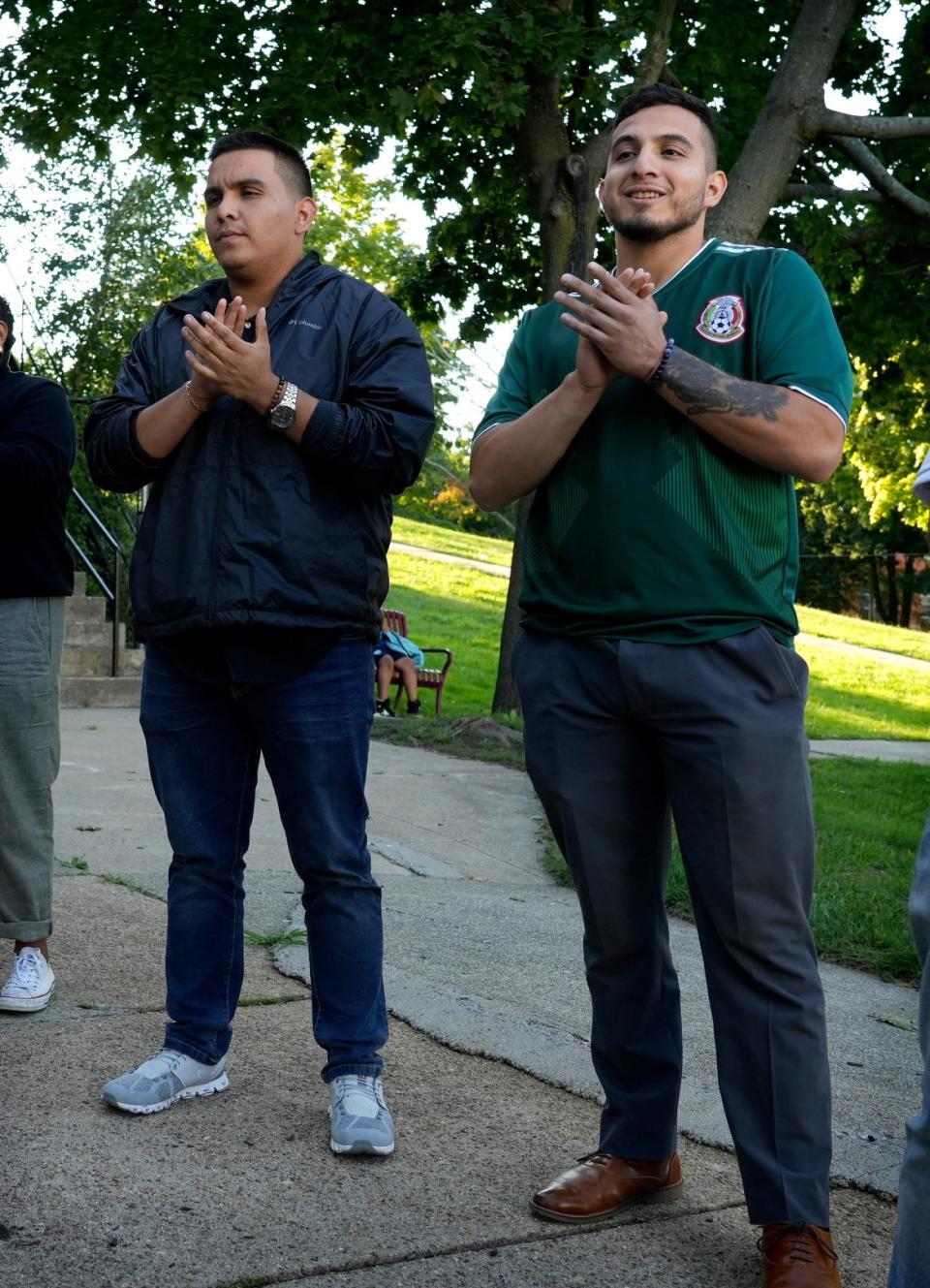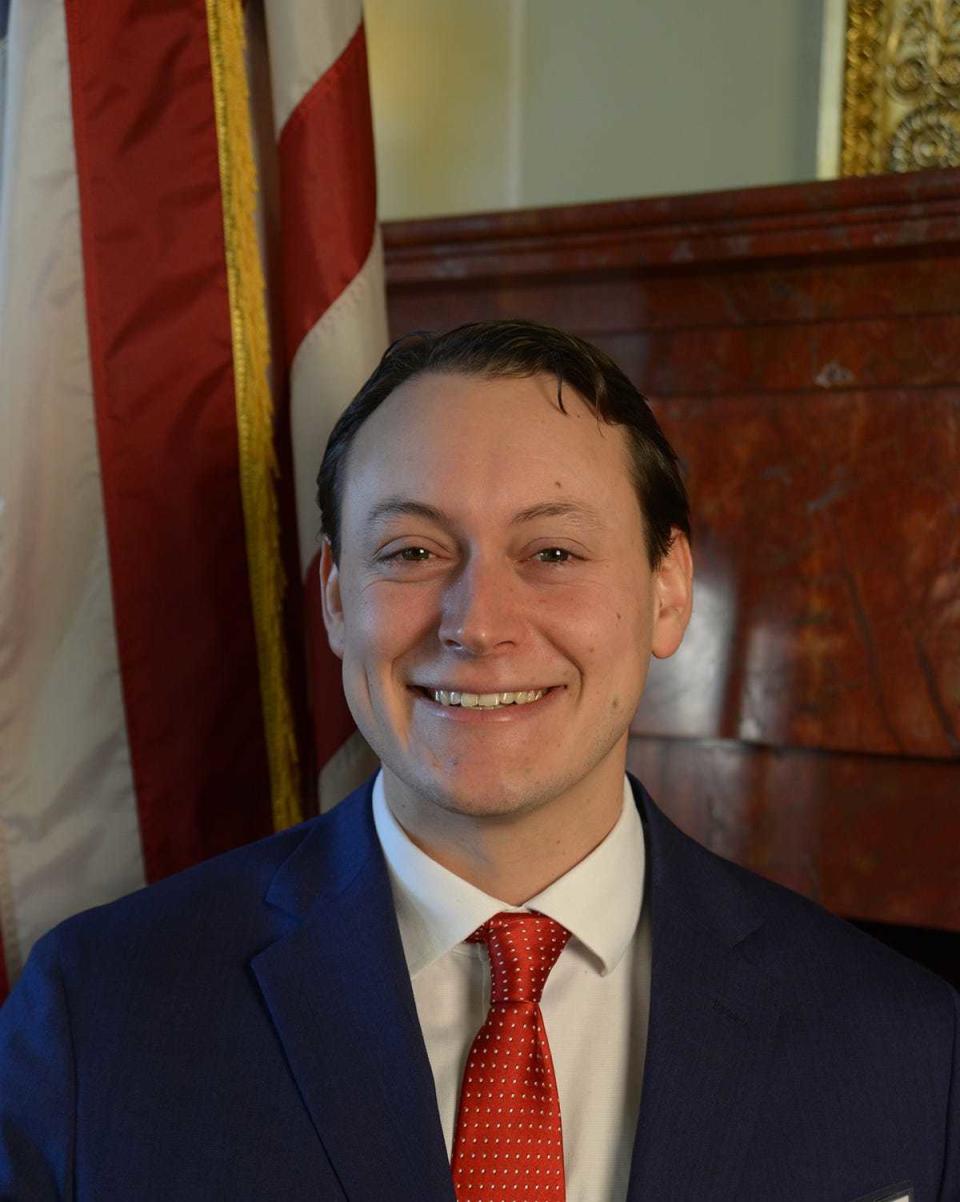Providence Democratic Socialists of America have a new name and rules. Here's what they want
Sometimes even radical political organizations need to pivot.
The Providence Democratic Socialists of America did just that recently, changing the group's name and, in a much bigger step, "breaking with the Democratic Party."
The local chapter of the leading American socialist group is now called Rhode Island DSA and it has a new strategy for creating a mass movement for working-class political independence.
"Workers need a democratic political organization to fight for their interests, separate from the capitalist class," the new political strategy manifesto approved by the group this spring reads. "The Democratic Party, which is internally undemocratic and controlled by capitalists, will not be that organization; Most progressives who run on the Democratic ballot line quickly submit to the Democratic establishment, and the rare exceptions are often due to individual fortitude rather than any repeatable strategy."
Group no longer endorses Democrats
Going forward, Rhode Island DSA will not endorse candidates who run for office as Democrats. Those it does support will need to practice "oppositional politics," "agitate for class struggle," and be "fully accountable to DSA membership."
"The party’s goal is to win political power for the working class, but with the understanding that the current system of government is only partially democratic and workers will not be able to wield power by simply electing a majority," the strategy document says. "The party does not make alliances with capitalists or their politicians. Socialist politicians avoid backroom deals and instead fight for reforms by calling out corrupt officials, unmasking the capitalist system, and encouraging mass movements."
More on the DSA: After voting for Shekarchi for speaker, Rep. Morales loses Democratic Socialists endorsement
Rhode Island DSA has representation in state and local politics
Rhode Island DSA's current size is such that, on a statewide level, the change is unlikely to have a huge impact on Ocean State ballot boxes in the near future.
But four DSA-endorsed candidates won elections last year – three in the General Assembly and one on the Providence City Council. And current Providence City Council President Rachel Miller was endorsed by the group in 2018.
It is not entirely without political juice.
Change reflective of wider tension within the progressive movement
The political tensions driving the new DSA strategy, the belief that compromise with those in power undermines movements for social change, has been around about as long as democracy.
It's been a key dynamic in some of the recent "progressive civil war" dustups over the past two years, including opposition in some parts of the Rhode Island left to Aaron Regunberg's congressional campaign.
A year ago the DSA chapter also signed a "coalition agreement" with the Rhode Island Political Cooperative, Sunrise Providence and the BLM RI PAC that codified a "shared goal of defeating the Democratic establishment in Rhode Island and winning a progressive governing majority."
Candidates subject to the agreement were not allowed to take donations from corporate PACS, corporate lobbyists, fossil fuel executives, police unions, correctional officers unions or top General Assembly leaders. They were also not allowed to vote for House Speaker K. Joseph Shekarchi, Senate President Dominick Ruggerio, House Majority Leader Chris Blazejewski or (now former) Senate Majority Leader Michael McCaffrey for any leadership position.
"Our organizations and politicians will work together to decide whether one of our legislators will run for a leadership position, and if so, which legislator," the agreement said. "Then, when this person runs for the position, all other legislators in our coalition are expected to vote for them."
One of the four 2022 DSA-endorsed officeholders, state Rep. David Morales, ran afoul of the prohibition on voting for Shekarchi last year and the group unendorsed him.
The other DSA-endorsed elected officials are state Sen. Sam Bell, Rep. Enrique Sanchez and Providence City Council member Miguel Sanchez, all Providence Democrats.

DSA-endorsed politicians intend to stick with the Democratic party
While they can't vote for Shekarchi or Ruggerio, the three existing office holders are grandfathered into the new Rhode Island DSA strategy and are allowed to run as Democrats without blowback.
Bell intends to do just that next year and argues that in the American two-party system, leaving both major parties to political opponents doesn't help.
"Terrible things happen when the right gains control over the Democratic Party," Bell wrote to Political Scene about DSA's plan to go independent. "I will run as a Democrat because I am a Democrat, and I refuse to back down to the conservatives trying to take control of our party."

"People do have a point when they say a lot of people sell out when they get elected," he went on. "That’s certainly true. But I don’t think that’s because of the party per se. It’s because of the power of the machine."
Bell said he identifies as a democratic socialist and rejects the "capitalist idea that we can build a decent society where we let everyone act in their own self-interest at the expense of others."
He offers the 19th-century, anti-slavery origins of the Republican party as proof that creation of a left-wing third party doesn't always end well.
"When it initially won power, it did great things," he said of the GOP. "But it soon sold out so unbelievably hard. It swung wildly to the right."
Although no longer a DSA-endorsed candidate, Morales still identifies as a democratic socialist, but is sticking with the Democrats.
"I identify with being part of the progressive wing of the party, which means making sure we are fighting for a minimum wage of $20-plus, working towards a single-payer health care system and, while that doesn't always align with the mainstream center of the Democratic Party, these are still important discussions to have and to push the party so it aligns better with the needs of working people," Morales told The Journal.
What does he think will result from Rhode Island DSA running third party candidates?
"It is all dependent on the grassroots organizing that takes place," he said. "If you are able to mobilize working people to break off from the Democratic party and organize around a series of issues that are most important to them, and are going to help actual people in meaningful ways, then yeah we will see an influence. But if it is based on rhetoric alone, then I don't think there will be much of an impact."
Neither Miller nor Enrique or Miguel Sanchez replied to a request for comment on the new DSA platform.
Rhode Island DSA not looking to become a political party
Rhode Island DSA plans to choose a legislative district with 3,000 to 4,000 general election voters (roughly the turnout of a Providence City Council race or state House district race) and a candidate to back in that district for the 2024 election. They'll also assemble a "campaign team of at least ten people," write a campaign plan and recruit supporters from out of state. "If this is not possible, the chapter will postpone endorsement to 2026," the strategy document said.
Although Rhode Island DSA wants to function more like a political party, it does not plan to legally become a party "in compliance with its status as a 501(c)(4) organization."
While breaking with the Democratic party might free candidates to take positions against House or Senate leaders, if they run with DSA backing, any stance they take would be subject to accountability from chapter members.
"Members are free to debate, publicly disagree with party decisions, and form factions when they wish (while respecting the will of the majority, which determines party policy)," the strategy document says. "The political coherence of the party is maintained through its educational programs and political organizing by cadre, rather than by top-down decrees."
As for the policy goals Rhode Island DSA is pushing for, the new platform includes:
State-owned co-operative-run housing with rent at 30% of occupant's income
Medicare for all
$25 per hour minimum wage
Free publicly-run child care and elder care
State utility ownership and construction of new state-owned renewable energy producers
This article originally appeared on The Providence Journal: Rhode Island DSA new name of Providence Democratic Socialists of America

